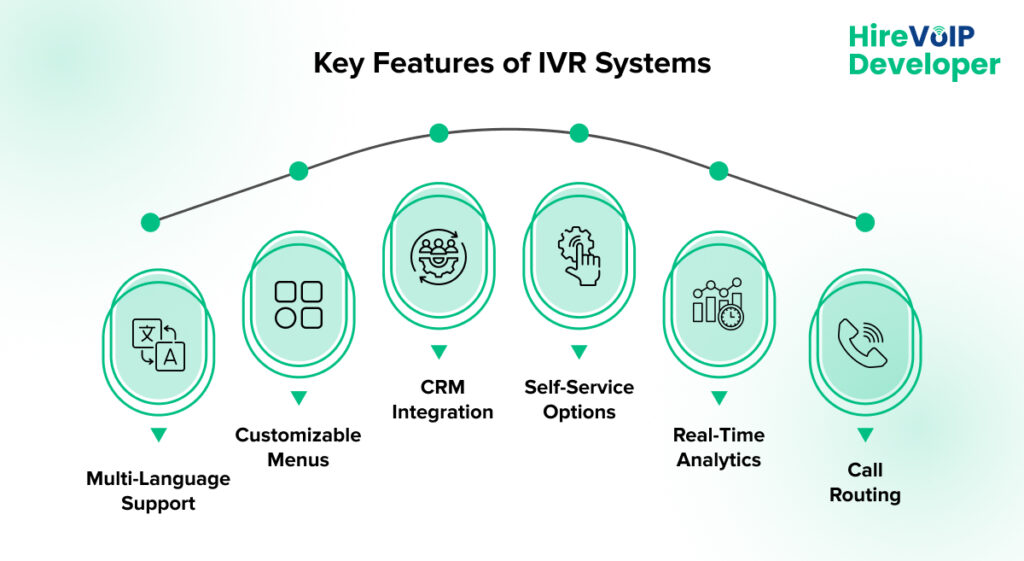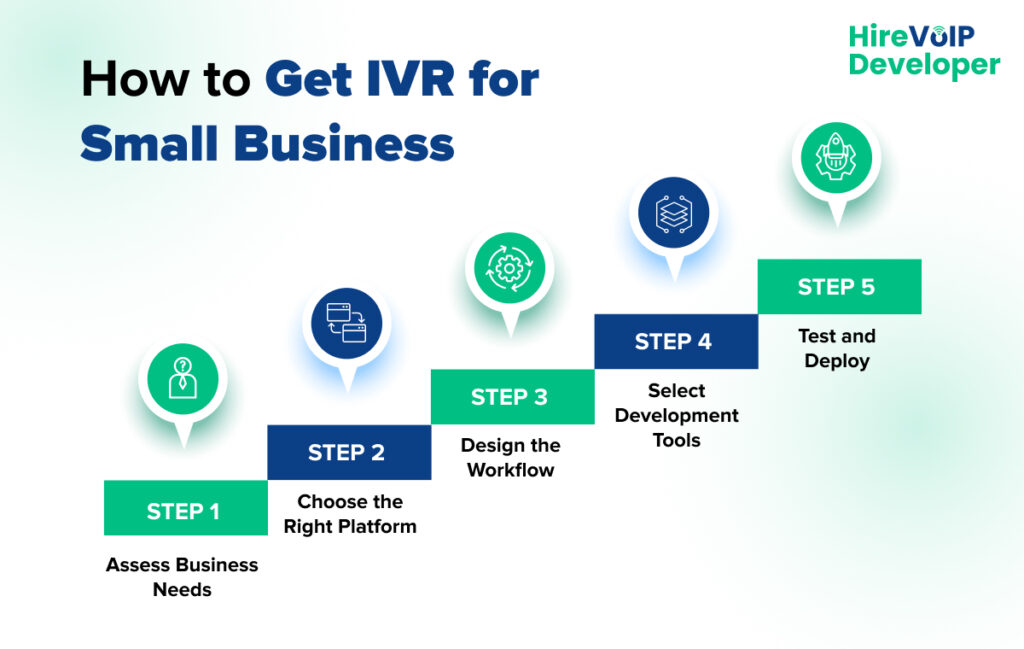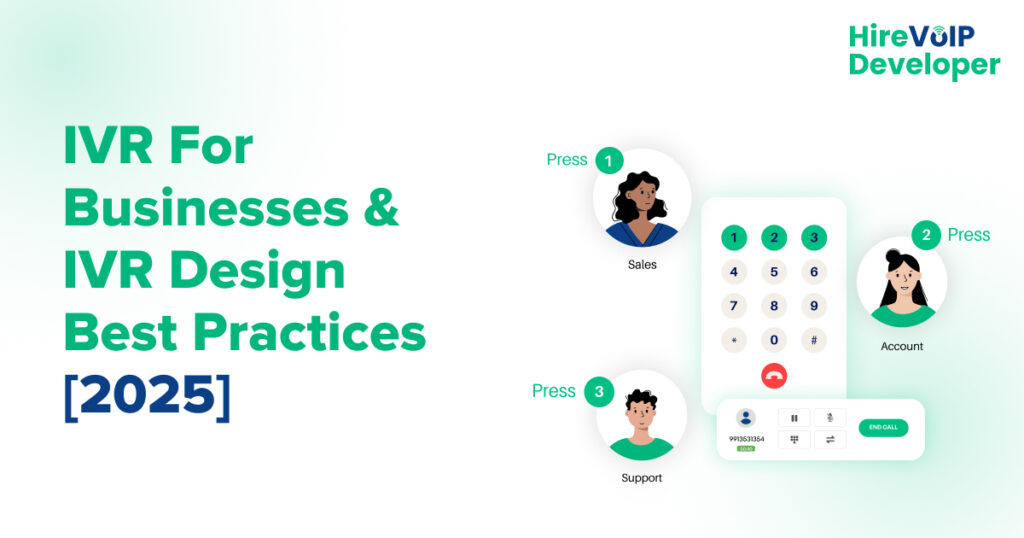Interactive Voice Response (IVR) systems have become a cornerstone of modern business communication, enabling efficient customer interactions, reducing response times, and streamlining call management. Whether you’re a startup looking for IVR solutions for small businesses or an enterprise aiming for advanced IVR for business scalability, this guide will walk you through the essentials of IVR software development, from design best practices to deployment strategies.
What Is IVR Software?
IVR software is an automated telephony system that interacts with callers, gathers input, and routes calls to the appropriate department or self-service option. Integrating databases and CRM allows businesses to handle high call volumes without compromising customer service quality.
Why Businesses Need IVR Software
Interactive Voice Response software has emerged as a powerful tool for achieving these goals. Here’s why businesses—large and small—should invest in an IVR system:
1. Enhance Customer Experience
IVR systems streamline customer interactions, offering self-service options that empower callers to resolve issues quickly and conveniently. Whether checking account details, tracking orders, or scheduling appointments, IVR systems reduce the need for live agent intervention while keeping customers satisfied.
2. Reduce Operational Costs
By automating repetitive tasks and call handling, IVR systems significantly lower the cost of maintaining large customer service teams. Businesses can allocate live agents to handle more complex inquiries, optimizing resources effectively.
3. Improve Call Management and Efficiency
With IVR systems, handling high call centers improves both efficiency and customer satisfaction. Features like intelligent call routing and prioritization ensure customers are connected to the right department or agent without unnecessary transfers.
4. Boost Productivity
Live agents often spend valuable time addressing repetitive queries. IVR software automates these tasks, allowing agents to focus on resolving complex issues and improving productivity and morale. Example: Self-service account balance or order tracking options free up agents for higher-value tasks.
5. Increase Scalability for Growing Businesses
Custom IVR software development ensures businesses can scale their customer service operations seamlessly. Whether you’re a startup or an enterprise, IVR systems adapt to growing customer bases and changing needs.
6. Support Data-Driven Decisions
Modern IVR systems provide analytics and reporting tools to monitor call patterns, identify customer pain points, and optimize workflows. These insights help businesses improve their processes and better understand customer behavior.
7. Personalize Customer Interactions
Integrating IVR systems with CRMs enables personalized interactions based on caller history and preferences. This improves the caller experience and strengthens customer loyalty.
8. Future-Proof Business Communication
Investing in an advanced IVR system positions your business for future growth. As technology evolves, IVR software can integrate with AI, machine learning, and other innovations to offer cutting-edge features like sentiment analysis and predictive call routing.
IVR systems are no longer a luxury but a necessity for businesses striving to deliver exceptional customer experiences while staying competitive. If you’re exploring IVR solutions for small businesses or building an enterprise-grade system, the benefits of adopting this technology are clear and impactful.
Your Customers Deserve Faster, Smarter Support. Start with an IVR Upgrade Now!
Key Features of IVR Systems
Interactive Voice Response (IVR) systems are indispensable for businesses seeking efficient, automated customer communication. Here are the key features of IVR systems that make them essential for companies of all sizes:

- Multi-Language Support: Enable seamless communication for global or diverse audiences, ensuring customers can interact in their preferred language.
- Customizable Menus: Tailored options allow businesses to design intuitive navigation, streamlining call handling and enhancing the customer experience. It is vital for IVR solutions for small businesses aiming to project professionalism.
- CRM Integration: Access customer data in real-time, providing personalized service based on caller history and preferences. Such integration elevates the effectiveness of IVR for business systems.
- Self-Service Options: Empower customers to resolve common issues, such as checking order status or account balances, reducing the need for live agents and improving efficiency.
- Real-Time Analytics: Track call performance, identify pain points, and optimize workflows. Analytics enhance decision-making for IVR deployment in dynamic environments.
- Call Routing: Use intelligent algorithms to connect callers to the appropriate department or agent, minimizing transfer times and enhancing satisfaction.
By leveraging these features, businesses can create cost-effective, scalable, and customer-friendly IVR software development solutions that enhance service delivery and efficiency.
IVR Design Best Practices
Creating an intuitive and user-friendly IVR system is crucial for its success. Follow these IVR design best practices to optimize user experience:
1. Keep Menus Simple
Avoid complex, multi-layered menus. Limit options to 3–5 per level and ensure descriptions are concise.
Example:
“Press 1 for Sales, 2 for Support, and 3 for VoIP Billing.”
2. Use Natural Language Processing (NLP)
Incorporating NLP into your IVR for small businesses ensures callers can interact using natural speech, making the system more intuitive.
3. Prioritize Call Routing
Efficient call routing reduces wait times and improves resolution rates. Leverage intelligent call distribution algorithms to connect callers to the right agents.
4. Personalize Caller Interactions
Utilize CRM data to greet customers by name or provide tailored options based on their account history.
Example:
“Welcome back, John! Press 1 for account details or 2 for recent transactions.”
5. Enable Easy Exit Options
Allow users to connect to a live agent if they encounter difficulties quickly.
Example:
“Press 0 anytime to speak with an agent.”
6. Optimize for Mobile Devices
Ensure your IVR system accommodates smartphone users, considering touch-screen-friendly menus and responsive voice commands.
By implementing these IVR design best practices, businesses can create efficient and user-friendly systems, ensuring seamless communication and higher customer satisfaction. A well-designed IVR system improves operational efficiency and strengthens your brand’s reputation for exceptional service.
How to Get IVR for Small Business
Developing and deploying an IVR system tailored to small businesses requires a strategic approach. Here’s how to start:

Step 1: Assess Business Needs
Identify the primary functions your IVR system should support, such as appointment scheduling, payment processing, or customer support.
Step 2: Choose the Right Platform
Select a scalable and cost-effective platform. Cloud-based call center solutions are ideal for small businesses due to lower upfront costs and easy maintenance.
Step 3: Design the Workflow
Map out the customer journey, from call initiation to resolution, ensuring a seamless and logical flow.
Step 4: Select Development Tools
Use development frameworks and APIs compatible with your telephony system. Popular tools include Twilio, Asterisk, and Genesys.
Step 5: Test and Deploy
Conduct rigorous testing to identify bugs or usability issues before deploying the system.
By following these steps, small businesses can implement an efficient and user-friendly IVR system that enhances customer satisfaction while staying within budget. Investing in the right IVR solutions for small businesses ensures scalability, professionalism, and long-term operational success.
How to Choose the Best Advanced IVR Software Solutions
With numerous options available, selecting the right IVR software can be daunting. Here’s what to consider:
1. Scalability
Opt for solutions that grow with your business, whether adding more lines or supporting complex workflows. Ensure the system can seamlessly handle seasonal call spikes and future business expansions.
2. Customizability
Ensure the software allows for tailored menu options, languages, and branding. This flexibility enables businesses to design a system that aligns with their unique operational needs and customer expectations.
3. Integration Capabilities
Look for IVR systems integrating CRMs, ERP systems, and analytics tools. Integration ensures smoother workflows and provides valuable insights for better decision-making.
4. User Experience
Choose software with an intuitive design interface and natural language capabilities. A user-friendly IVR system reduces caller frustration and enhances overall customer satisfaction.
5. Cost-Effectiveness
Evaluate both upfront and ongoing costs, keeping budget constraints in mind. Compare pricing models and opt for solutions that deliver maximum value without overextending resources.
By focusing on scalability, integration, and user experience, businesses can select advanced IVR software solutions that align with their goals and deliver exceptional customer service. The right choice ensures long-term efficiency, adaptability, and customer satisfaction.
Challenges and Ways to Overcome in IVR Software Development
While IVR software development offers immense benefits, it also comes with challenges. Addressing these effectively ensures a successful and user-friendly system:
1. Complex Integration
Connecting an IVR system with existing CRMs, databases, and telephony infrastructure can be challenging. Misalignment during integration may lead to data consistency or system incompatibilities.
Solution: Partner with experienced developers skilled in integrating IVR systems with diverse technologies. Utilize APIs and middleware to bridge gaps and ensure smooth data flow. Testing the system in real-world scenarios before deployment can preempt potential integration issues.
2. Cost Concerns
Custom IVR solutions often involve significant upfront costs, which can be challenging for small businesses. Software licenses, infrastructure, and maintenance expenses add to the financial burden.
Solution: Consider cloud-based IVR solutions for small businesses, which offer a cost-effective alternative to on-premise systems. Evaluate pricing plans and prioritize features critical to your business to avoid overspending on unnecessary functionalities.
3. User Frustration
Poorly designed IVR menus, unclear navigation, and long wait times can frustrate callers, leading to negative customer experiences. Frequent misrouted calls or inability to reach live agents further compound the issue.
Solution: Adhere to IVR design best practices by creating intuitive menus with clear instructions and minimal layers. Offer callers easy access to live agents when needed. Use real-time monitoring and customer feedback to refine workflows continuously.
Businesses can develop robust, efficient, and customer-friendly IVR software solutions that enhance operational efficiency and customer engagement by addressing these challenges with strategic planning and the right tools.
The Future of IVR for Business
Emerging IVR software development trends are revolutionizing how businesses communicate with customers, ensuring greater efficiency and satisfaction.
1. AI-Powered IVR
AI-driven systems offer advanced features like voice recognition, predictive call routing, and real-time feedback. These systems can understand natural language, making interactions more intuitive and user-friendly. With AI, businesses can automate complex workflows, analyze sentiment, and deliver highly personalized customer experiences.
2. Cloud-Based IVR
Cloud solutions provide unmatched scalability and cost savings, making them an attractive option for businesses of all sizes. They eliminate the need for extensive infrastructure, ensuring quick deployment and hassle-free updates. Cloud IVR can quickly scale to handle higher call volumes as businesses grow, making it ideal for dynamic industries.
3. Omnichannel Integration
Future IVR systems will seamlessly integrate with other communication channels, ensuring a unified customer experience. This includes connecting phone, email, chat, and social media interactions, allowing customers to switch channels effortlessly. Such integration gives businesses a holistic view of customer interactions and ensures platform continuity.
As technology evolves, IVR systems will become more innovative, adaptable, and central to customer service strategies. Businesses that embrace these innovations will be better positioned to deliver superior experiences and maintain a competitive edge.
Ready to Deliver Exceptional Customer Service? Let’s Build IVR Strategy Today.
Elevate Your Business with Smart IVR Solutions
IVR systems are transformative tools for businesses, offering streamlined customer interactions, cost savings, and scalability. They simplify complex communication workflows, reduce operational costs, and ensure 24/7 availability for customer support. Whether exploring IVR solutions for small businesses or designing enterprise-grade systems, adopting IVR design best practices and leveraging innovative technologies can set you apart in a competitive market. An IVR system can enhance customer satisfaction and drive operational efficiency with the right approach. Visit Hire VoIP Developer to learn more about how our expertise can elevate your communication strategy and help you achieve your business goals.
FAQs



